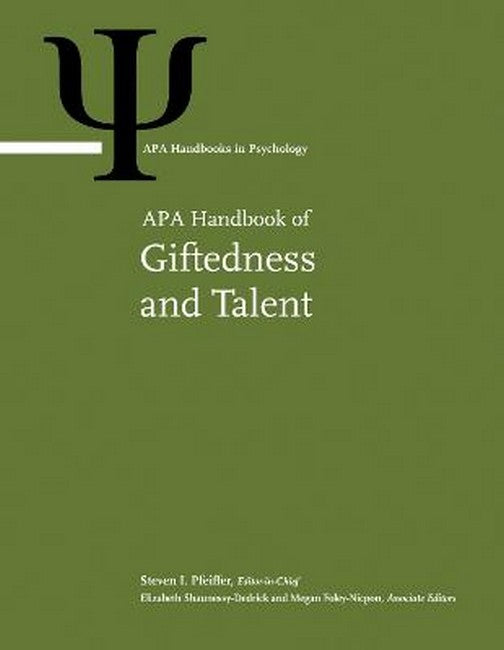Steven I. Pfeiffer, PhD, ABPP, is a professor at Florida State University in Tallahassee, where he served as director of clinical training for over years. He has also been a professor at Duke University in Durham, North Carolina, serving as executive director of their gifted program, and he has been the executive director of the Devereux Institute of Clinical Training and Research in Villanova, Pennsylvania. Dr. Pfeiffer is an internationally recognized expert on the mental health and well-being of gifted individuals. He has twice testified at the White House before the National Task Force on Health Care Reform, and in 2 2, he was a distinguished visiting scholar at the National Institute of Education, in Singapore. Dr. Pfeiffer has an active clinical practice and conducts workshops for parents, teachers, and mental health professionals on topics related to gifted students. He is lead author of the Gifted Rating Scales, one of the most widely used rating scales in gifted identification. His most recent books include Serving the Gifted (2 3) and Essentials of Gifted Assessment (2 5). In 2 5, he coedited with Maureen Neihart and Tracy Cross the second edition of Social and Emotional Development of Gifted Children: What Do We Know?. Dr. Pfeiffer is on the editorial board of journals and frequently is invited to consult with educational programs and various organizations. For the past 5 years, he has served as a consultant to the Eris Foundation in Milan, Italy.
Request Academic Copy
Please copy the ISBN for submitting review copy form
Description
Editorial Board About the Editor-in-Chief Contributors Series Preface Introduction I. History and Global Perspectives A History of Giftedness: A Century of Quest for Identity David Yun Dai International Perspectives and Trends in Research on Giftedness and Talent Development Heidrun Stoeger, Daniel Patrick Balestrini, and Albert Ziegler A Historical Overview of Instructional Theory and Practice in the United States and Canada: The Double Slinky Phenomenon in Gifted and General Education Bruce M. Shore and Maren Gube Gifted Education in Europe: Implications for Policymakers and Educators Javier Tour amp oacute n and Joan Freeman Gifted Education in Asia David W. Chan Gifted Education in Australia and New Zealand Leonie Kronborg Challenges on the Identification and Development of Giftedness in South America Solange Muglia Wechsler, Sheyla Blumen, and Karen Bendelman Gifted Education in the Middle East Hanna David Gifted Education in Africa Jacobus G. Maree II. Theories and Conceptions of Giftedness and Talent Theories of Intelligence Robert J. Sternberg Academic Talent Development: Theory and Best Practices Fran amp ccedil oys Gagn amp eacute The Three-Ring Conception of Giftedness: A Developmental Approach for Promoting Creative Productivity in Young People Joseph S. Renzulli and Sally M. Reis The Role of Motivation D. Betsy McCoach and Jessica Kay Flake Flow Theory: Optimizing Elite Performance in the Creative Realm Mihaly Csikszentmihalyi, Monica N. Montijo, and Angela R. Mouton Talent Development as the Most Promising Focus of Giftedness and Gifted Education Rena F. Subotnik, Paula Olszewski-Kubilius, and Frank C. Worrell Talent Development: A Path Toward Eminence Frank C. Worrell, Rena F. Subotnik, and Paula Olszewski-Kubilius Expertise: Individual Differences, Human Abilities, and Nonability Traits Phillip L. Ackerman From Giftedness to Eminence: Developmental Landmarks Across the Life Span Dean Keith Simonton Creativity James C. Kaufman, Sarah R. Luria, and Ronald A. Beghetto III. Gifted Identification and Assessment Identification of Strengths and Talents in Young Children Nancy B. Hertzog, Rachel U. Mun, Bridget DuRuz, and Amy A. Holliday Methods to Increase the Identification Rate of Students From Traditionally Underrepresented Populations for Gifted Services Michael S. Matthews and Scott J. Peters Acceleration and the Talent Search Model: Transforming the School Culture Susan G. Assouline, Ann Lupkowski-Shoplik, and Nicholas Colangelo IV. Gifted Education: Curriculum and Instruction Considerations in Curriculum for Gifted Students Joyce VanTassel-Baska Teaching Strategies to Support the Education of Gifted Learners Catherine A. Little Research-Guided Programs and Strategies for Nurturing Creativity Jonathan A. Plucker, Jiajun Guo, and Anna Dilley Developing Talents in Girls and Young Women Barbara A. Kerr and Jessica Gahm Identifying and Educating Underrepresented Gifted Students William Ming Liu and LaNeisha Waller Examining Gifted Students' Mental Health Through the Lens of Positive Psychology Shannon M. Suldo, Brittany V. Hearon, and Elizabeth Shaunessy-Dedrick V. Psychological Considerations Social and Emotional Considerations for Gifted Students Anne N. Rinn The Role of the Family in Talent Development Paula Olszewski-Kubilius, Frank C. Worrell, and Rena F. Subotnik Three Crucial Dimensions for Students With Intellectual Gifts: It Is Time to Stop Talking and Start Thinking David Lubinski and Harrison J. Kell Psychological Issues Unique to the Gifted Student Maureen Neihart and Lay See Yeo Counseling Gifted Children and Teens Jean Sunde Peterson VI. Special Issues Policy, Legal Issues, and Trends in the Education of Gifted Students Kristen R. Stephens Psychological Interventions for Twice-Exceptional Youth Megan Foley-Nicpon and Margaret M. Candler Underachievement and the Gifted Child Del Siegle and D. Betsy McCoach Attention Deficit/Hyperactivity Disorder in Gifted Students Marcia Gentry and C. Matthew Fugate Emotional Intelligence and Giftedness Gerald Matthews, Jinchao Lin, Moshe Zeidner, and Richard D. Roberts Suicide Among Students With Gifts and Talents Tracy L. Cross and Jennifer Riedl Cross Beyond Trait Theory Accounts of Giftedness Matthew T. McBee, Kayla Mitchell, and Samantha K. Fields Johnson Career Counseling and the Gifted Individual: Applying Social Cognitive Career Theory to the Career Decision Making of Gifted Individuals Susannah M. Wood, Carol Klose Smith, and David K. Duys Perfectionism and the Gifted Kenneth G. Rice and Merideth E. Ray Bullying and the Gifted Dorothy L. Espelage and Matthew T. King Index
amp ldquo The history and unique needs of gifted and talent students should prompt important questions from researchers and educators. Exploring the topic from a range of areas provides a rich and complex picture of the importance of the subject, both in terms of gifted and talented individuals themselves and the benefits that they contribute to society through their potential achievements. amp rdquo -Choice

